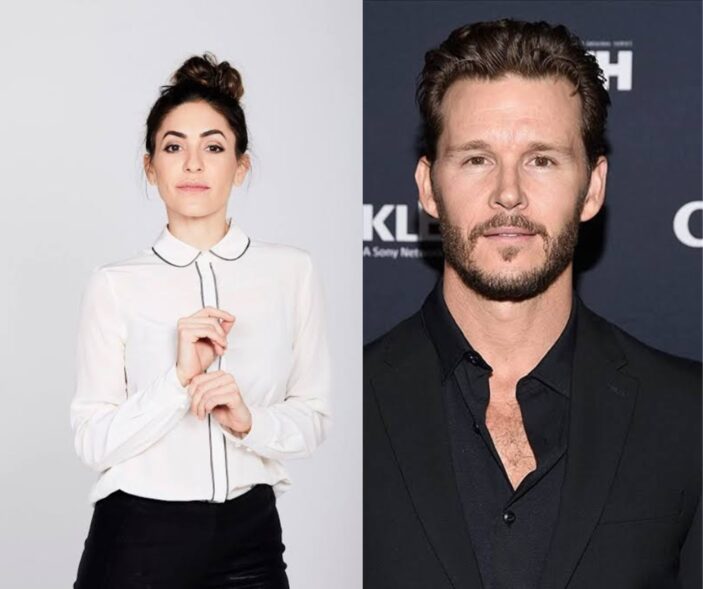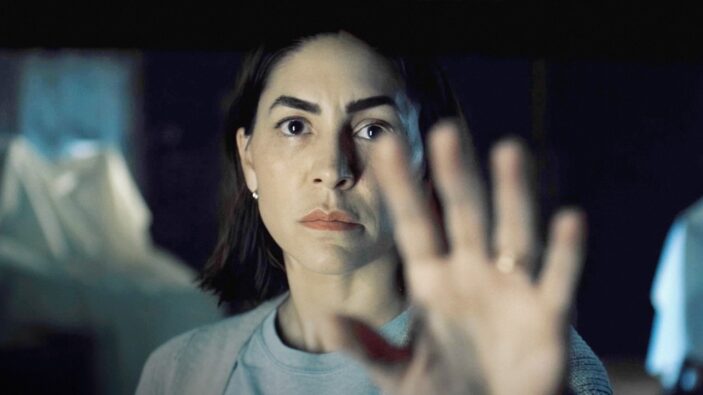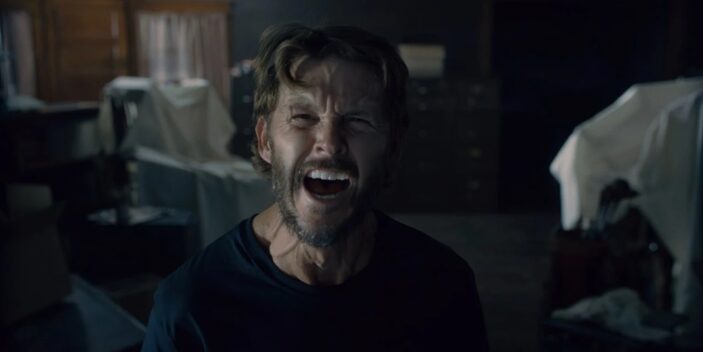
In the wake of her husband’s devastating accident, a devoted wife becomes consumed by a mysterious portrait that resembles him in his happier days. However, as her obsession intensifies, the painting starts to unleash terror upon her life, leading her to question whether it is possessed by a malevolent force or if she is losing her sanity. Caught between the haunting unknown and her own fears, she must confront her deepest fears and unravel the unsettling truth before it’s too late.
Written by screenwriter David Griffiths (Collateral Damage, The Hunted), The Portrait is a tragic, terrifying film that explores trauma and grief, and how they can manifest in manners that defy comprehension. Headlined by Natalia Córdova-Buckley and Ryan Kwanten, the film is set to unnerve audiences this week in the US as it arrives on Digital and On Demand.
To coincide with its release, Peter Gray spoke with the duo about how their personal dynamic assisted their professional one and what they individually drew inspiration from.
Without giving too much away, because there’s certainly a lot to talk about where the film travels, the dialogue balance here very much favours your character, Natalia. When you both got the script, what was that initial reaction in realising where the film went and navigating your individual character dynamics?
Natalia Córdova-Buckley: I found them incredibly interesting. That dynamic, precisely as you say, of a silent character and a talkative one. I love the process of acting without words. I’m kind of scared of talking sometimes. As an actor, not as a person (laughs). I can talk all day as a person. But I was really intrigued by it. I remember calling my manager and saying, “Oh, that character, Alex, whoever gets this role, what a delight. How delicious that he’s going to get to act (that).” I was so excited to observe whoever got it (and) how they were going to do it. And then Ryan got it, and he came in and blew it out of the water.
And when you’re acting with someone, I don’t like to observe with judgement or with analysis, because you’re in the moment. Afterwards I would see pictures that the crew took, and there’s one in particular where (Ryan and I) are looking out a window. I’m behind him looking at the ocean, and Ryan has this look of a child. I just found his transformation so wonderful. And his silence so loud. He wasn’t saying much, but he was saying so much with everything else. I was really excited to see what Ryan was going to do (with the character). And in terms of (my character) Sofia, she’s such a complex character. I never get to play this intense of a complexity, and then to also carry a film when you’re in almost every frame…I’ve never gotten that opportunity in my career. So that, and the subject of grief, made me really want to get in the race and try it out to see how I could do it.
Ryan Kwanten: Yeah, I echo all Natalia’s sentiments. As well, David Griffiths, our illustrious screenwriter, he came in with a huge pedigree to this, and to have the opportunity to work on an original story in a day and age where rehashes, remakes, prequels and sequels are the only things getting made… you really have to fight tooth and nail to get these (movies) up. They are no small miracle when they do get up and financially come to fruition. I knew this was going to a going-to-the-depth-of-human-emotion type of role, and to play a character that could only express himself without words was a real opportunity. I actually didn’t find it overly challenging (laughs). I come from a family where my mother never draws breath. So me and my (two) brothers, we were always subjugated to listening anyway.
In acting, I admire the ones that kind of share the value of breath between words, and this was a real colliding of both that sort of generational trauma, as well as the trauma from a brain injury. My character has no sense of fear, no sense of real emotion, not even love, and (this movie) is his wife’s journey to reclaim that, which is really powerful. And to do it under the guise of a psychological horror/thriller, our director Simon (Ross) had such a great stranglehold on what type of movie he wanted. And Natalia and I were willing to go to the end of the Earth to get it there.

Ryan, your character is literally in Natalia’s care, and as an actor you’re in her hands. You can really tell there’s that trust there between you both as performers. Did you have much time to build that relationship prior to shooting? Or did you come to find that as you were filming?
Natalia Córdova-Buckley: We didn’t have much time, for sure. Ryan and I met the first day we were shooting pictures for (our character’s) wedding. Then two days later we were shooting the film. This was made in 18 days, with a tiny budget and little time. But this film is also so full of magic. There was trust between Ryan and I. Between Simon and both of us. And, of course, it existed within the crew too. It’s all the stuff you can’t see. I think trust is the most important thing in filmmaking. We’ve got to trust each other, right? If you distrust then you’re just going to cut everyone’s wings, and try to micromanage everyone. I felt like Ryan and I knew each other from another lifetime when I first met him.
Ryan Kwanten: We’ve definitely been to war together on some battlefield somewhere (laughs).
Natalia Córdova-Buckley: What would we have fought together? (Laughs). I felt this kindredship. The first thing we spoke about was our love for the ocean. We both grew up in the ocean, and, look this might sound cheesy and exaggerated to people, but when you love something like that, like nature, and you have this connection to something that impacts or defines you, you tend to connect easily with people through that. We had a lot of things in common. I think our relationships with our partners, the way we deal with our careers, the value we put in our work, all that professionalism just came out very fast.

Films, in general, so often live and die off their main characters and their believability, and the horror genre can revel in the outlandish, so the success can ride on the actor’s commitment. I was right there with you, Natalia. Was there anything you specifically tapped into or drew inspiration from with this character?
Natalia Córdova-Buckley: It was during the pandemic when we shot, so we were all going through grief. There was already this energy of loss around us. I lost my two dogs and my cousin, who was like a brother, literally within the three months prior to the film, so I was in a state of grief and loss. When I read the script I knew that it had found me for a reason. Something I loved about the script is the idea of losing someone in life, of having someone there but you can’t reach them. The comfort of death is that you have no option but to let go. You have to grieve, and let them expand to transition into the universe. But with Alex, she has none of that. She’s in this limbo state of grief that I think is very rare to be able to explore.
There’s so much here to unpack emotionally, but also with that aforementioned ending, it really gives you plenty to talk about. From a genre point of view, is there any narrative twists that stands out for both of you?
Natalia Córdova-Buckley: I think you can’t go past The Sixth Sense.
Ryan Kwanten: I think what Jodie Foster and Jonathan Demme did a great job with what they did with Silence of the Lambs.
Well, mentioning movies, I watch far too many, so it’s really nice to watch something and be taken aback by what was unfolding on screen, because I wasn’t expecting this to be as emotional as it was. Really, hats off to everybody involved. I know this was Simon’s debut feature as a filmmaker too. The horror genre seems to be one of those main areas where creativity and originality and emotion can really thrive, and we don’t always think immediately of the genre doing that.
Ryan Kwanten: Thank you, Peter. Just echoing your sentiments to the genre, it’s part of the reason that I’ve chosen to pretty much singlehandedly stay in the genre for the last 10 years. (Horror) does things that the mainstream just isn’t. They’re telling stories that are affecting people. That stay with you long after the credits have rolled. If we need anything in this day and age it’s that we need to tell stories that are going to affect people. For me, personally, I want to go into every film endeavour hoping to come out of it a better person. And (The Portrait) was one of those cases.
The Portrait is available in the United States on Digital and On Demand from December 8th, 2023. An Australian release is yet to be determined.
